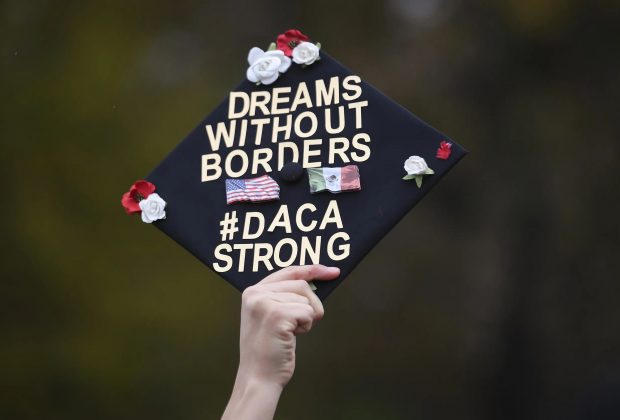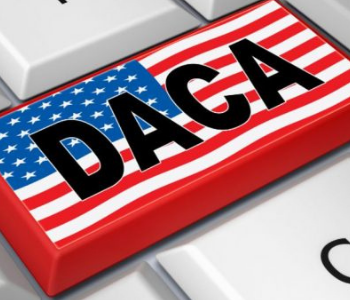By Aly J. Yale | Business Insider | JAN. 26, 2023 | Photo by Reuters
With overall college tuition up 10% since 2010 — and up nearly 20% for private institutions — it's no surprise that many students need financial assistance. Unfortunately, for students with DACA status, paying for college is even more challenging than it is for other students.
Unlike US-born students, DACA recipients aren't eligible for federal student loans or grants. They do have some options, though. Here's what DACA students can do to help cover the costs of college.
What is DACA?
DACA is the Deferred Action for Childhood Arrivals program launched by the Department of Homeland Security (DHS) in 2012. It protects undocumented residents who were brought in as minors, ensuring they can't be deported from the country. It also affords them a work permit should they want one.
DHS is no longer accepting first-time DACA applications, though renewals are still being processed. To qualify for DACA, you must have:
- Been 30 or younger as of June 15, 2012
- Come to the US at age 16 or younger
- Lived in the US since at least June 15, 2007
- Entered the country without inspection (or you fell out of lawful visa status prior to June 15, 2012)
- Been physically present in the US on June 15, 2012
- Not been convicted of a felony, significant misdemeanor, or more than three misdemeanors
You can't pose a threat to national security or public safety. You need to currently be in school, have graduated from high school or obtained a GED, or have been honorably discharged from the armed forces or Coast Guard.
Even after meeting these strict requirements, DACA students do not enjoy the same benefits as US-born students and are not eligible for federal scholarships, grants, or aid. In Alabama and South Carolina, DACA students aren't even qualified to attend public colleges.
Can DACA students get student loans?
DACA students are not eligible to receive any sort of federal student aid, including scholarships or grants. They may, however, qualify for state aid, money from their colleges, and private loans and scholarships.
"DACA students can get loans, but not all student loans are created equal," says Colin Pears, founder and executive director at Highpoint Education. "Private loans are much less advantageous to students. They may have very high interest rates, immediate repayment requirements, prepayment penalty fees, and no deferment or forbearance options."
In some cases, DACA students also qualify for in-state tuition, which can make the cost of attendance significantly lower. The rules vary widely by state.
"In 35 states, DACA students have access to in-state tuition; 17 of those states — and Washington, DC — provide DACA students with comprehensive access to in-state tuition as well as access to some state-run financial aid and scholarships," Pears says. "But the climate of support for DACA students varies radically from state to state, and because the type and amount of support is largely determined at the state level, this remains an especially complex and unbalanced issue."
DACA students in Virginia, for example, can access in-state tuition and state-run financial aid programs. In neighboring Tennessee, though, DACA students aren't eligible for either benefit.
California has an application for DACA students in the state, which allows them to apply for in-state tuition, state aid, and work study programs.
"Students who complete the California Dream Application receive equivalent gift aid to those who are eligible for federal student aid via the FAFSA," says Rebecca Sanchez, director of financial aid and scholarships at University of California Irvine. "We provide University Grants to replace the Pell Grant, and they are also eligible for the Cal Grant."
What are alternatives to student loans?
Some states allow DACA students to apply for state financial aid programs. To see if yours is one of them, check with your state's education department or office of financial aid.
You can also apply for private scholarships, though eligibility requirements vary by program, so always verify with the scholarship's sponsor before applying. TheDream.US, GoldenDoorScholars.org, and QuestBridge.org are three scholarship avenues DACA students may want to explore.
Finally, many colleges offer scholarship and grant programs for students, which are occasionally open to DACA recipients. Keep in mind that you will need to file the Free Application for Federal Student Aid (FAFSA) for these, even though they're not federal programs.
Look at all your options
DACA students who need help paying for college certainly have options available — but they're more limited than the choices US-born students have.
Because of this, it's important you look at all your choices before deciding which avenue to move forward with.
"My advice for a DACA student would be first to target colleges and universities that either provide access to in-state tuition rates or that will pay for 100% of a student's demonstrated financial need," Pears says. "Next, explore grants and scholarships available through your state. "Students should only consider private loans as a last resort."







